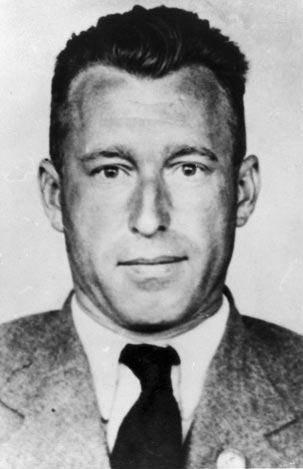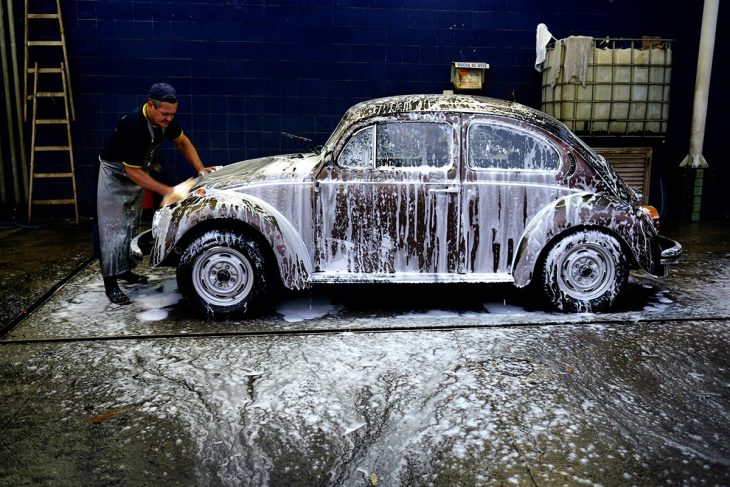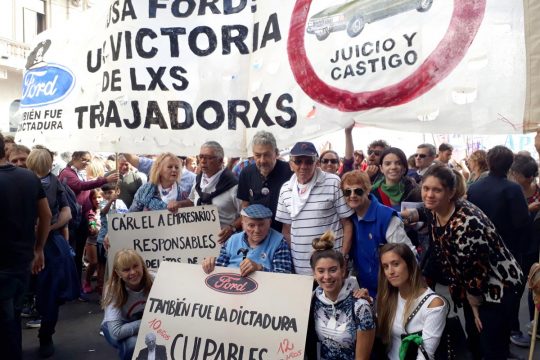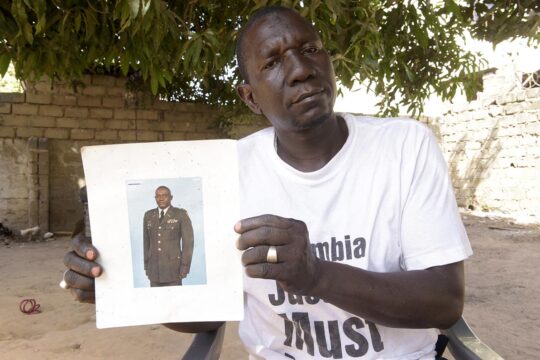Gustavo, a little boy of about ten years old, approaches the improvised stage to sign a document. It is a symbolic signature, in the name of his grandfather Lúcio Bellentani, a former communist activist denounced to the authorities by his employer, Volkswagen, before spending 19 months in jail. At the beginning of the 1970s, Brazil was living through the most repressive phase of the military regime. Now it is time for reparations. An out-of-court settlement has just been reached, under the auspices of the Attorney General’s Office, between the German car manufacturer and the victims of the collaboration between Volkswagen and the repressive bodies of the time. It is this agreement on which little Gustavo has just affixed his signature.
His grandfather Bellentani died a year before the agreement was reached. At the end of September this year, the 50 or so people gathered at the metalworkers' union in the São Paulo suburbs, including Gustavo, were there both to celebrate the agreement and to pay tribute to him. There was a festive atmosphere mixed with strong emotion. "People embraced each other as if the pandemic no longer existed. Some had red carnations in their hands, others were crying," says Tarcísio Tadeu Garcia, who was Bellentani's apprentice before taking over as head of the association of Volkswagen worker victims of the dictatorship, which is known as the Heinrich Hagge Association.
"For the first time in the history of capitalism, a multinational corporation has been found responsible for crimes committed 40 years ago. That’s how important this agreement is," says Tarcisio Tadeu Garcia, who was also prosecuted for his political opinions and detained at the Department of Political and Social Order (DOPS), the dictatorship's intelligence service. He was fired by Volkswagen and claims that he was put on file and never managed to find a job afterwards.
Volkswagen recruited former Nazi

At the legal level, Volkswagen and the victims' association have concluded a so-called "compliance agreement" (TAC, according to the Brazilian acronym), under the aegis of the Attorney General's Office. Three investigations were conducted simultaneously by the Federal Attorney General's Office, the São Paulo State Attorney General's Office, and the Labour rights Attorney’s Office, following a complaint filed in 2015. It took two years before negotiations opened between the victims' association and their employer at the time. In Brazilian legislation, the TAC is a conciliation mechanism that saves long legal proceedings.
"The role of the Attorney General's office has been important. The prosecutors helped to get the Volkswagen deposition and get our side of the story heard. Volkswagen's plant security officer, Colonel Rudge, also testified. He denied the whole thing, but at that point it was no longer possible to deny the evidence," says Tadeu Garcia. Records showed that the security and intelligence apparatus at the Volkswagen plant was set up by a former Nazi, Franz Stangl, who was recruited by the German manufacturer's Brazilian subsidiary in the 1950s.
The car maker’s "regrets"
Volkswagen has never denied the facts, even if it has sometimes been suspected of trying to duck and run away from its responsibilities. In a report commissioned by the company itself, historian Christopher Kopper says that the company demonstrated "complete loyalty to the military government and adherence to its economic and domestic policy objectives". Following the agreement reached under the auspices of the Attorney General's Office, Hiltrud Werner, member of the Volkswagen AG board of directors responsible for legal affairs, expressed in a communiqué the company's "regret" for "the violations committed in the past".
"We are aware of the collective responsibility of all economic and social actors to respect human rights and to enforce them. For Volkswagen AG, it is important to deal responsibly with this negative chapter in Brazil's history and to promote transparency," he says. Volkswagen is due to issue a public statement on this subject in the Brazilian press in the near future.
“Promoting transitional justice in Brazil”
After three years of negotiations, the Heinrich Plagge Association obtained reparations of 36.3 million reais (about 5.5 million euros), about half of which will be paid to the association itself and another part will be used to build a monument in memory of the victims. "This compliance agreement (...) is unprecedented in Brazilian history and is of enormous importance for the promotion of transitional justice in Brazil and around the world," said prosecutors at the Attorney General’s Office. The victims' association agrees, although it notes that the agreement "is late in coming".
The negotiations were sometimes bitter. They stalled on several occasions and reached an impasse at least twice. The steelworkers' union then mobilized to put pressure on Volkswagen. "We threatened to organize demonstrations during the launch of new cars, or to enter the factory with coffins as a sign of mourning," recalls Tadeu Garcia.
It was also the presence of the metalworkers' union in the company's international bodies, especially in the Volkswagen World Workers' Committee in Germany, that weighed in the balance. "This is what led the company to review its initial positions," says Wagner Santana, the union's current president.
Some 50 companies collaborated
But the story certainly doesn't end there. As part of the reparations agreement, the Federal University of São Paulo State (Unifesp) will receive 4.5 million reais (approximately 700,000 euros) to help identify victims buried in mass graves, and for research to clarify the role of other companies in such human rights violations during this period.
"These reparations are necessary so that (...) other comrades in other companies can achieve the same victory. This agreement is a reference point. It's not just about ‘Volks’, because the coup of 1964 was carried out with the consent of employers," says Wagner Santana, president of the metalworkers' union of the São Paulo suburbs.
According to the National Truth Commission (CNV), which investigated the crimes of the dictatorship in Brazil, around 50 companies collaborated with the military regime, including Johnson & Johnson, Esso, Pirelli, Texaco, Pfizer and British American Tobacco, according to its final report published in 2014.
Autonomous Attorney General in Bolsonaro’s Brazil
Paradoxically, this victory of the Volkswagen workers comes under the extreme right-wing presidency of Jair Bolsonaro, who has himself denied the existence of the dictatorship and defended the use of torture.
"Brazil is very divided today,” says Raimundo Simão, a lawyer for the victims' association. “There are still many people who support the ideologies from the top [that of Bolsonaro] and deny the existence of the dictatorship during the military regime. Today, human rights are rated rather low. It is very difficult to defend human and social rights in Brazil today."
"We are going through a dark period," says Tadeu Garcia. However, the independence of the Attorney General's Office from the executive (and even the judiciary), guaranteed by the Constitution, has made this possible. "Its prosecutors have full autonomy. The Attorney General's Office is not subordinate to the government," says Simão. Meanwhile, the government has not reacted to the announcement of this agreement between Volkswagen and the victims' association.







